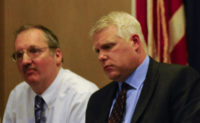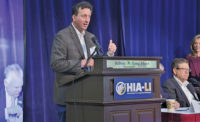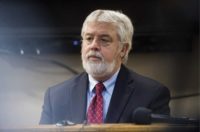As legal theater, the long trial of two engineering firms for their role in the Flint, Mich., water crisis ended with a thud. A federal jury in Ann Arbor, Mich., earlier this month deadlocked and the judge declared a mistrial. For ENR’s news team, the trial was partly about whether the two engineering firms accused of negligence, LAN and Veolia, were culpable and owed damages to three children, the plaintiffs, who were exposed to lead in the city’s drinking water in 2014 and 2015. Critical aspects of engineering ethics were also being evaluated.
Lead exposure in the water had been blamed for causing learning disabilities in scores of children and medical problems among adults in the majority Black city located about 60 miles from Detroit. The two companies, no doubt in consultation with lawyers and insurers, decided not to participate in the $626-million settlement on which one other engineer and numerous government agencies and entities signed off. If found guilty, the engineers were likely to be sued by many other plaintiffs who also were victims of the mismanaged city water supply.
At times it seemed that the engineering profession itself was on trial. ENR had covered the water crisis and recognized as an Award of Excellence winner a university engineering professor, Marc Edwards, who helped expose the danger. So ENR’s editors felt it was important to report on the trial.
Running 21 weeks with 43 witnesses, the trial required our team to monitor events via the court’s Zoom video system. The team consisted of ENR Online Editor James Leggate, Chicago-based Technology Editor Jeff Yoders and me. “I thought coverage by Zoom was interesting because, in many ways, we were seeing the trial the way the Flint families and Veolia and LAN were,” said Yoders.
I stepped in to cover testimony of the ethics and standard of care expert witness for the plaintiffs, Richard Humann, CEO of H2M Architects and Engineers. He claimed that both firms failed to act to stop or limit the public danger despite having the knowledge and obligation to alert higher government authorities.
Did the standard of care Humann described mean that engineers are essentially watchdogs who must identify and report the activities of irresponsible government clients, as Yoders suggested during one of our many discussions?
I remember plaintiff’s attorney Corey Stern exhorting the jury in opening comments that whenever the defense talked of contract scope—anticipating the defendants’ claim that they were shut out of crucial decisions about the water source switch or, in LAN’s case, its advice was bypassed—to just ignore those arguments. How, I thought, if the jury pays no attention to a contract scope, do engineers judge their liability? That critical unresolved issue is only one of the reasons why, if the lawsuit will be tried again, as the childrens’ attorneys pledged, ENR will be there to report about it to you.






Post a comment to this article
Report Abusive Comment